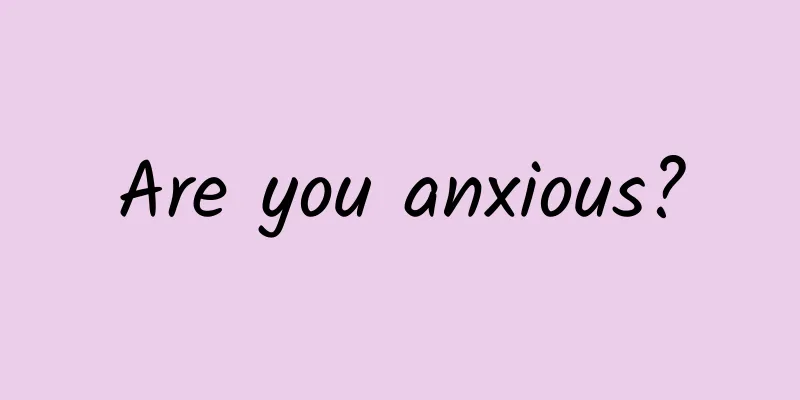Are you anxious?

|
Anxiety disorder is a neurotic disorder characterized by widespread and persistent anxiety or recurrent panic attacks, often accompanied by symptoms such as dizziness, chest tightness, palpitations, dyspnea, dry mouth, frequent urination, sweating, and other autonomic nervous system symptoms and motor restlessness. The patient's tension level does not match the actual situation, and his anxiety does not come from actual threats or dangers. The occurrence of anxiety disorder is closely related to genetic factors, personality traits, and psychosocial factors. The elderly are prone to anxiety disorders due to negative life events such as decreased physical function, physical illness, retirement, and living alone. 1. What are the specific manifestations of anxiety disorder? (1) Psychiatric symptoms: inexplicable fear, anxiety, constant nervousness, increased alertness, and unrealistic assessment of the danger faced by oneself or others. (2) Behavioral manifestations: Motor restlessness (fidgeting, rubbing hands and feet, trembling limbs, and small, aimless movements). (3) Physical symptoms: mainly manifested as symptoms of autonomic hyperfunction, such as palpitations, shortness of breath, chest tightness, dry mouth, sweating, limb tremors, flushed or pale face, constipation, diarrhea, frequent urination, urgency, etc. In severe cases, it may manifest as fainting, a feeling of sternum pressure, a feeling of throat blockage, or shortness of breath and difficulty breathing. 2. Is being prone to anxiety a disease? Anxiety is a common emotional response when people face stress and difficulties, but anxiety does not necessarily mean that it is a clinically significant pathological emotion. Moderate anxiety has positive significance. It can fully mobilize the functions of various organs in the body, improve the brain's reaction speed and alertness, help people concentrate, and maintain sensitivity to the surrounding environment. Pathological anxiety refers to persistent nervousness and uneasiness without a specific reason, and the sense of threat or impending disaster without sufficient realistic basis, often accompanied by obvious symptoms of autonomic dysfunction (such as palpitations, sweating, chest tightness, muscle tension, etc.), subjective pain or impaired social function. Only when pathological anxiety is the main manifestation is it called anxiety disorder, and it should be treated in time. 3. What are the treatments for anxiety disorders? Treatments for anxiety disorders currently include medication and psychotherapy. Medication includes anti-anxiety drugs such as antidepressants, benzodiazepines, and buspirone; psychotherapy is mainly cognitive behavioral therapy (CBT), which can significantly reduce anxiety symptoms and improve treatment compliance. It should be the first choice for patients such as pregnant women who are not suitable for medication. Psychotherapy can be used in combination with medication or alone. It is generally believed that medication takes effect quickly and has better effects in the acute phase, while psychotherapy has a longer-lasting effect but requires more time and energy. 4. What are some ways to cope with anxiety disorder? (1) Increase self-confidence: For objects that cause you anxiety, you should correctly accept the anxiety they bring, face them bravely, and actively use self-suggestions to increase your self-confidence and gradually adapt to relieve anxiety. (2) Seek support: You can talk about your situation to friends, family members and other people who understand you and express your true thoughts. This kind of expression can effectively reduce the pain of anxiety. (3) Analyze the causes: Discuss the sources or triggers of stress with professionals and develop appropriate stress coping strategies. (4) Distract attention: When anxiety attacks, the mind is always full of random thoughts, restlessness, and extreme pain. This kind of thinking often forms a vicious cycle. The more anxious you are, the more you think, and the more you think, the more anxious you become, and you cannot get rid of it. At this time, a strong distraction stimulus can be used to block negative emotions. (5) Self-relaxation: You can relax and relieve anxiety by doing things that interest you, such as handicrafts, listening to music, traveling, etc. When you are overly nervous or anxious, try to close your eyes lightly, relax your whole body, take a few even and rhythmic deep breaths, and repeatedly tell yourself: "Don't be anxious" and "Relax, relax". After a few minutes, your mood will be stable. |
<<: Do you understand depression?
>>: "Empty-Nest" Elderly People Beware of "Empty-Nest Syndrome"
Recommend
How to check for unicornuate uterus
I believe that many women should be unfamiliar wi...
Understand at a glance: 9 “pitfall-avoiding” guidelines for COVID-19 medication!
After the epidemic prevention and control policie...
An article to understand the "dangerous" foods in life
Author: Chen Zhou Shanghai Changhai Hospital Revi...
Attention! Don’t use this internet celebrity “panacea” recklessly!
Erythromycin ointment, which costs as low as one ...
What is the differential diagnosis of pelvic tuberculosis?
Pelvic tuberculosis is very harmful to patients a...
Is it necessary to give birth if the amniotic fluid is too low at 37 weeks?
The amniotic fluid of pregnant women is an import...
What to do if you have a cold, cough, or sore throat during breastfeeding
The bodies of breastfeeding mothers are still in ...
What is the best bath for women in winter?
As we all know, taking a hot bath in the cold win...
Can I eat tomatoes after having an abortion?
After an abortion, women’s bodies are very weak, ...
Can a dishwasher replace a disinfection cabinet? How to choose the right dishwasher
The most common dishwashers are impeller and jet ...
Best time to conceive after menstruation
For women who want to have a baby after the end o...
How to know how many weeks pregnant
Many women realize they are pregnant long after t...
What are the signs of early miscarriage?
I believe everyone is familiar with miscarriage. ...
My aunt is not coming
All normal women will have menstruation. Whether ...
Is it normal to have blood clots on the sixth day after medical abortion?
When there are still blood clots coming out of th...









